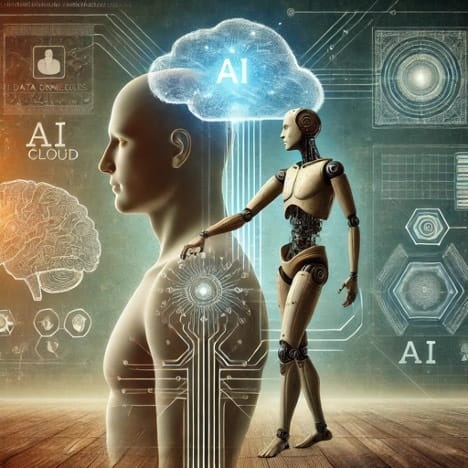At FuturePoint Digital, our core competency lies in building AI-driven applications across a diverse array of industries—ranging from dynamic pricing models based on real-time data to AI-enhanced online learning platforms and sophisticated recruiting and hiring systems. However, at the heart of our mission is a deep commitment to enhancing the human experience. We believe that advancements in artificial intelligence should always prioritize and uplift the human condition. To this end, we integrate insights from the social sciences, neuroscience, ethics, human-computer interaction, and other domains to inform and guide our AI models, ensuring they are designed to support and improve individual and societal well-being.
In this segment, we explore the importance of developing self-confidence and how AI-driven platforms might play a crucial role in helping individuals achieve greater self-awareness, self-acceptance, and personal growth.
Introduction
Self-confidence is a crucial component of mental health and overall well-being. It affects how we perceive ourselves, interact with others, and tackle life's challenges. According to Bandura (1997), self-confidence is a belief in one's ability to succeed in specific situations or accomplish a task, which plays a pivotal role in how we approach goals, tasks, and challenges. With the advent of artificial intelligence (AI), we have new tools at our disposal that can assist in the journey towards self-awareness, self-acceptance, and personal growth.
Self-confidence is a crucial component of mental health and overall well-being. It affects how we perceive ourselves, interact with others, and tackle life's challenges. According to Bandura (1997), self-confidence is a belief in one's ability to succeed in specific situations or accomplish a task, which plays a pivotal role in how we approach goals, tasks, and challenges. With the advent of artificial intelligence (AI), we have new tools at our disposal that can assist in the journey towards self-awareness, self-acceptance, and personal growth.
What is Self-Confidence?
Self-confidence refers to a person's belief in their own abilities and judgement. It involves a sense of self-assurance that arises from an appreciation of one's abilities and qualities (Schunk & Pajares, 2002). High self-confidence is associated with better performance, greater satisfaction in life, and improved mental health (Stajkovic & Luthans, 1998). The following elements highlight the core aspects of self-confidence:
Self-confident people are comfortable in their own skin: They accept themselves for who they are, with all their strengths and weaknesses.
They're not afraid to say "no": They understand their boundaries and are not afraid to uphold them.
They embrace failure as a learning opportunity: They recognize that failure is part of the journey toward achieving a goal.
They don't compare themselves to others: They understand that everyone has their own path and timeline in life.
They're open to feedback and criticism: They see constructive criticism as a vital part of personal growth.
They spread positivity and uplift others: They encourage and support those around them.
They're comfortable with silence: They don't feel the need to fill every second with words, understanding that their worth is measured by the substance of what they say.
They admit when they're wrong: They know that making mistakes is part of being human and have no issues admitting when they're wrong.
They're OK with not being liked by everyone: They accept that they can't please everyone.
They practice self-care regularly: They prioritize their needs, understanding that self-care is not a luxury but a necessity.
How AI Can Help Develop Self-Confidence
Being Comfortable in Our Own Skin: AI-powered self-assessment tools can provide personalized insights into one's strengths and weaknesses, promoting self-acceptance. For instance, apps like Woebot use AI to offer cognitive behavioral therapy (CBT), helping users to understand and accept themselves better (Fitzpatrick et al., 2017).
Being Comfortable with Saying "No": Interactive AI simulations can help individuals practice setting boundaries and saying "no." Digital coaches, like those found in apps such as Replika, provide assertive communication advice and scripts, helping users develop confidence in upholding their boundaries (Luxton, 2014).
Embracing Failure as a Learning Opportunity: AI-assisted reflection tools analyze past failures to extract lessons. Adaptive learning systems, such as those used by Duolingo, adjust learning paths based on individual failures and successes, reinforcing the idea that failure is a step towards improvement (Settles, 2020).
Not Comparing Ourselves to Others: AI-driven personal development plans focus on individual progress. Social media analysis tools can monitor and provide feedback on usage to reduce unhealthy comparisons. Apps like Fabulous encourage users to celebrate personal milestones rather than comparing themselves to others (Bickmore & Schulman, 2007).
Being Open to Feedback and Criticism: AI tools can provide unbiased, constructive feedback. Virtual mentors available on platforms like BetterUp offer advice and constructive criticism, helping users to see feedback as a part of their growth process (Goleman, 2006).
Spreading Positivity and Uplifting Others: AI platforms promote positive reinforcement and encouragement. Virtual communities and support groups, powered by AI on platforms like Talkspace, help foster positive interactions and community support (Andersson & Titov, 2014).
Being Comfortable with Silence: Mindfulness and meditation apps powered by AI, such as Headspace, promote the practice of being comfortable with silence. These tools guide users through meditation sessions that help them become more at ease with themselves and their thoughts (Goyal et al., 2014).
Admitting When We’re Wrong: AI tools encourage honesty and accountability. Virtual mentors on apps like Coach.me provide guidance on admitting mistakes and learning from them, promoting a culture of transparency and growth (McGonigal, 2011).
Being OK with Not Being Liked by Everyone: AI tools promote self-acceptance and reduce the need for external validation. Virtual therapy sessions on platforms like BetterHelp focus on building self-worth and resilience against external opinions (Barak et al., 2008).
Practicing Self-Care Regularly: Personalized self-care plans developed by AI-driven apps like MyFitnessPal offer reminders and track progress for self-care activities. These tools emphasize the importance of self-care in maintaining mental and physical health (Kerner & Grossman, 2001).
Idea in Practice: SelfAscend—Your Personal Self-Confidence Coach
SelfAscend is fictional AI-driven app that illustrates how and AI platform might be designed to enhance self-confidence through personalized guidance and support. Upon sign-up, users complete a comprehensive questionnaire, allowing the app to generate a detailed self-assessment report. Based on this, the app creates dynamic development plans tailored to each user's unique needs and goals. The plans adapt as users progress, ensuring continuous growth and support.
Interactive AI coaching is at the heart of SelfAscend. Users engage with a virtual coach that offers real-time advice and feedback, simulating various scenarios to help practice assertiveness and resilience. The app also integrates mindfulness and self-care exercises, promoting mental well-being and inner peace. Additionally, users can join virtual support groups, fostering a positive community where experiences and encouragement are shared.
SelfAscend would be built with a strong emphasis on ethics and security. It prioritizes user well-being, transparency, and inclusivity while adhering to strict data privacy standards. Users have full control over their data, which is securely stored and encrypted. Regular security audits ensure compliance with data protection regulations. Combining advanced AI technology with a deep understanding of human psychology, ConfidAI provides a powerful tool for self-confidence development, empowering users to achieve greater self-awareness, self-acceptance, and personal growth.
Conclusion
The journey to developing self-confidence is ongoing and requires time, self-awareness, self-acceptance, and personal growth. AI provides innovative tools that can support this journey by offering personalized guidance, fostering self-reflection, and promoting positive behaviors. As AI technology continues to advance, its potential to assist in personal development and self-confidence will only grow, providing even more sophisticated and accessible resources for individuals seeking to enhance their well-being.
Call to Action
At FuturePoint Digital, we're passionate about creating AI solutions that enhance the human experience. Do you have an innovative idea for an AI app that can make a difference? We'd love to hear from you! Contact us today to discuss how we can collaborate on practical AI app development to support personal growth and well-being. Let's turn your vision into reality together!

About the Author: David Ragland is a former senior technology executive and an adjunct professor of management. He serves as a partner at FuturePoint Digital, a research-based AI consultancy specializing in strategy, advisory & educational services, as well as custom AI application development. David earned his Doctorate in Business Administration from IE University in Madrid, Spain, and a Master of Science in Information and Telecommunications Systems from Johns Hopkins University. He also holds an undergraduate degree in Psychology from James Madison University and completed a certificate in Artificial Intelligence and Business Strategy at MIT. His research focuses on the intersection of artificial intelligence with organizational and societal dynamics.References:
Andersson, G., & Titov, N. (2014). Advantages and limitations of Internet-based interventions for common mental disorders. World Psychiatry, 13(1), 4-11.
Bandura, A. (1997). Self-efficacy: The exercise of control. New York: Freeman.
Barak, A., Hen, L., Boniel-Nissim, M., & Shapira, N. (2008). A comprehensive review and a meta-analysis of the effectiveness of Internet-based psychotherapeutic interventions. Journal of Technology in Human Services, 26(2-4), 109-160.
Bickmore, T., & Schulman, D. (2007). Practical approaches to comforting users with relational agents. CHI '07 Extended Abstracts on Human Factors in Computing Systems, 2291-2296.
Fitzpatrick, K. K., Darcy, A., & Vierhile, M. (2017). Delivering cognitive behavior therapy to young adults with symptoms of depression and anxiety using a fully automated conversational agent (Woebot): A randomized controlled trial. JMIR Mental Health, 4(2), e19.
Goleman, D. (2006). Social Intelligence: The New Science of Human Relationships. Bantam Books.
Goyal, M., Singh, S., Sibinga, E. M., Gould, N. F., Rowland-Seymour, A., Sharma, R., ... & Haythornthwaite, J. A. (2014). Meditation programs for psychological stress and well-being: a systematic review and meta-analysis. JAMA Internal Medicine, 174(3), 357-368.
Kerner, M. S., & Grossman, A. H. (2001). Scale construction for measuring attitude, beliefs, perception of control, and intention to exercise. Journal of Sports Medicine and Physical Fitness, 41(1), 124-131.
Luxton, D. D. (2014). Artificial Intelligence in Behavioral and Mental Health Care. Academic Press.
McGonigal, K. (2011). The Willpower Instinct: How Self-Control Works, Why It Matters, and What You Can Do to Get More of It. Avery.
Schunk, D. H., & Pajares, F. (2002). The Development of Academic Self-Efficacy. In A. Wigfield & J. Eccles (Eds.), Development of Achievement Motivation (pp. 15-31). San Diego: Academic Press.
Settles, B. (2020). Machine Learning and Education. In C. Sammut & G. I. Webb (Eds.), Encyclopedia of Machine Learning and Data Mining. Springer.
Stajkovic, A. D., & Luthans, F. (1998). Self-efficacy and work-related performance: A meta-analysis. Psychological Bulletin, 124(2), 240-261.
Hashtags:
#ArtificialIntelligence #MachineLearning #DeepLearning #AI #DataScience #BigData #Robotics #NLP (Natural Language Processing) #ComputerVision #AIResearch #TechTrends #AIethics #AIinnovation #FutureOfWork #Automation #SmartTechnology #IoT #DigitalTransformation #AIApplications #AIInBusiness
#SocialSciences #Sociology #Psychology #Anthropology #PoliticalScience #Economics #CulturalStudies #BehavioralScience #SocialResearch #PublicHealth
#Business #Entrepreneurship #Marketing #Management #Finance #Startups #Leadership #BusinessStrategy #Innovation #Sustainability
#Humanities #History #Philosophy #Literature #ArtHistory #CulturalStudies #Linguistics #Classics #Theology #Ethics

